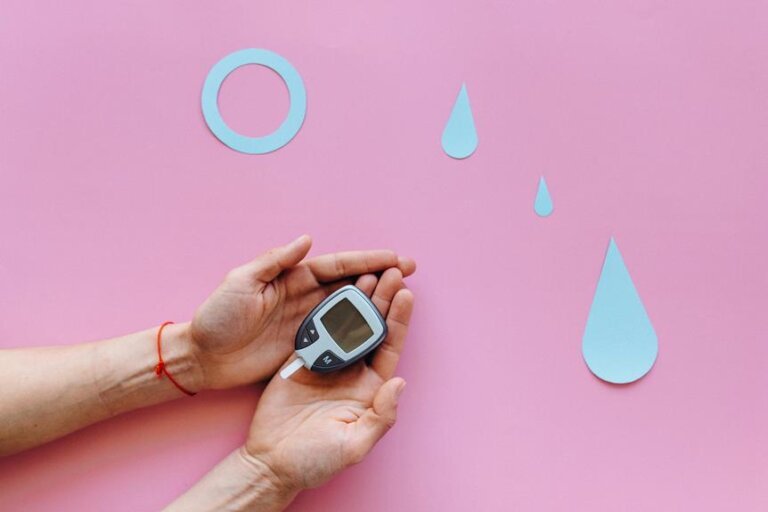Skinny but at Risk: Understanding Diabetes in Thin Individuals
You may have encountered individuals who seem slender, yet diabetes still poses a threat to their health. But have you ever wondered why this paradox exists?
The intricacies of diabetes in thin people go beyond what meets the eye. Understanding the underlying reasons behind this phenomenon can shed light on how diabetes manifests in different body types. It's a complex interplay of factors that challenge conventional beliefs about weight and health.
Stay tuned to unravel the mysteries of diabetes in lean individuals and discover the crucial insights that could reshape your understanding of this metabolic condition.
Thinness and Diabetes Connection
When considering the connection between thinness and diabetes, it's essential to understand how body weight influences the risk factors for this condition. While it's commonly believed that only overweight individuals are at risk for diabetes, being thin doesn't guarantee immunity from the disease. Thin individuals can also develop diabetes due to various factors such as poor diet, lack of physical activity, and genetic predisposition.
Maintaining a healthy weight isn't solely about being thin; it involves having a balanced lifestyle that includes nutritious eating habits and regular exercise. Thin people can be metabolically unhealthy, with excess visceral fat around their organs despite appearing slim externally. This type of fat can disrupt insulin function and lead to diabetes, even in individuals who aren't overweight.
Therefore, it's crucial for thin individuals to prioritize their overall health by adopting healthy habits that support proper insulin function and reduce the risk of diabetes, regardless of their weight. By focusing on lifestyle choices that promote well-being, even thin individuals can effectively manage their diabetes risk.
Genetic Predisposition to Diabetes
Having a genetic predisposition to diabetes can significantly increase your risk of developing the condition, regardless of your body weight. Genetics play a crucial role in determining your susceptibility to diabetes. If you have close family members with diabetes, especially parents or siblings, you're more likely to inherit the genetic factors that contribute to the development of the disease. This genetic predisposition can make you more vulnerable to diabetes even if you're thin.
Certain genes can affect how your body processes glucose, produces insulin, or regulates blood sugar levels. These genetic variations can impact your risk of developing diabetes, making it important to be aware of your family history and genetic predisposition. While being thin may lower your overall risk of diabetes, a genetic predisposition can outweigh this factor and increase your chances of developing the condition. Understanding your genetic risk can help you take proactive steps to prevent or manage diabetes effectively.
Metabolic Factors in Thin Individuals
Metabolic factors play a crucial role in determining the risk of diabetes in thin individuals. Even though thin people may appear healthy on the outside, metabolic issues can lurk beneath the surface, predisposing them to diabetes. One significant factor is insulin resistance, where the body's cells become less responsive to insulin, leading to elevated blood sugar levels. This can happen in thin individuals due to genetic predisposition or unhealthy lifestyle habits.
Furthermore, thin individuals may have excess visceral fat around their organs, even if they've a low overall body fat percentage. Visceral fat is metabolically active and can contribute to insulin resistance and inflammation, increasing the risk of diabetes. Additionally, poor dietary choices, such as consuming high amounts of processed sugars and fats, can further exacerbate metabolic imbalances in thin individuals.
Understanding these metabolic factors is essential for identifying the early signs of diabetes in thin individuals and implementing preventive measures. By addressing these underlying issues, even those who appear slim can reduce their risk of developing diabetes and lead healthier lives.
Lifestyle Impacts on Thin Diabetics
Exploring how lifestyle choices impact thin individuals with diabetes reveals crucial insights into managing the condition effectively. While being thin may lower your risk of developing diabetes, unhealthy lifestyle habits can still lead to its onset. For instance, consuming a diet high in refined sugars and processed foods can contribute to insulin resistance, even in thin individuals. Therefore, being mindful of your dietary choices and opting for whole, nutrient-dense foods can help regulate blood sugar levels and prevent complications.
Regular physical activity is another crucial aspect of managing diabetes in thin individuals. Engaging in regular exercise not only helps control weight but also improves insulin sensitivity, making it easier for your body to regulate blood sugar levels. Even if you're thin, incorporating a mix of cardiovascular exercise and strength training into your routine can have significant benefits for your overall health.
Additionally, managing stress levels and getting an adequate amount of quality sleep are vital for thin individuals with diabetes. High stress levels can elevate blood sugar levels, while poor sleep can disrupt hormone regulation, both of which can negatively impact diabetes management. By prioritizing a healthy lifestyle that includes balanced nutrition, regular exercise, stress management, and ample sleep, thin individuals with diabetes can effectively manage their condition and reduce the risk of complications.
Diagnosis Challenges for Skinny Individuals
You may face difficulties in receiving a diabetes diagnosis due to weight misperception, where healthcare providers mightn't consider diabetes in skinny individuals.
Evaluating your metabolic health becomes crucial in such cases to ensure an accurate diagnosis.
Additionally, genetic predisposition should be taken into account when diagnosing diabetes in thin individuals.
Weight Misperception in Diagnosis
When diagnosing diabetes in thin individuals, healthcare providers may encounter challenges due to weight misperception. Since thin individuals may not exhibit classic obesity-related symptoms, such as excess weight or visibly large waistlines, diabetes could be overlooked or misdiagnosed.
This weight misperception can lead to delayed diagnosis and treatment, putting skinny individuals at risk for complications associated with unmanaged diabetes. Healthcare professionals must consider other risk factors beyond weight when evaluating thin individuals for diabetes, such as family history, blood pressure, cholesterol levels, and physical activity levels.
Metabolic Health Evaluation
Challenges in diagnosing diabetes in thin individuals extend to evaluating metabolic health, posing unique obstacles that healthcare providers must navigate. Due to their slender build, thin individuals may not display typical signs of metabolic issues, such as central obesity. This can lead to delays in diagnosis and treatment.
Additionally, standard metabolic markers like cholesterol levels and blood pressure may appear normal in thin individuals with diabetes, further complicating the diagnostic process. Healthcare providers must adopt a holistic approach, considering factors beyond weight and traditional metabolic indicators.
Specialized tests focusing on insulin resistance, pancreatic function, and glucose metabolism may be necessary to accurately assess metabolic health in skinny individuals at risk of diabetes.
Genetic Predisposition Consideration
Considering the genetic predisposition of thin individuals can present significant diagnostic challenges in identifying diabetes early. Due to their slender build, symptoms of diabetes may not be as noticeable in thin individuals compared to those who are overweight. Genetic factors can play a crucial role in the development of diabetes, even in individuals with lower body weights.
This genetic predisposition may lead to a delayed diagnosis, as healthcare providers mightn't immediately consider diabetes in thin patients. It's essential for healthcare professionals to be aware of these genetic influences and consider them when evaluating thin individuals for diabetes.
Managing Diabetes in Thin Bodies
To effectively manage diabetes in thin bodies, focusing on maintaining stable blood sugar levels through a balanced diet and regular exercise is crucial. Even though weight management mightn't be a primary concern, monitoring carbohydrate intake is essential. Opt for whole grains, fruits, vegetables, and lean proteins while limiting sugary and processed foods. Spread your meals throughout the day to prevent blood sugar spikes and crashes. Incorporating physical activity into your routine helps improve insulin sensitivity and regulate blood sugar levels. Aim for at least 150 minutes of moderate-intensity exercise per week, such as brisk walking, cycling, or swimming.
Regular monitoring of blood sugar levels is vital for thin individuals with diabetes. This practice allows you to understand how your body responds to different foods and activities. Work closely with your healthcare provider to develop a personalized diabetes management plan that considers your unique needs as a thin individual. Remember, managing diabetes is a continuous process that requires commitment and consistency to maintain overall health and well-being.
Preventive Strategies for Thin Individuals
When managing diabetes as a thin individual, focus on your diet. Incorporate balanced meals with a mix of proteins, carbohydrates, and healthy fats.
Engage in regular exercise routines that suit your lifestyle and health condition to help regulate blood sugar levels effectively.
Monitor your blood sugar levels consistently to catch any fluctuations early. Make necessary adjustments to maintain optimal health.
Diet for Thin Diabetics
Taking a proactive approach to managing diabetes as a thin individual involves tailoring your diet to support your health goals. Focus on a well-balanced diet rich in whole grains, lean proteins, fruits, and vegetables. Monitor your carbohydrate intake to regulate blood sugar levels effectively. Opt for complex carbs like quinoa, brown rice, and whole-wheat bread over refined sugars.
Incorporate healthy fats from sources like avocados, nuts, and olive oil to promote heart health. Limit sugary beverages and processed foods high in trans fats and sodium. Stay hydrated and consider smaller, more frequent meals to maintain steady energy levels.
Consulting a dietitian can help customize a meal plan that suits your specific needs and supports your overall well-being.
Exercise Routines for Thin Diabetics
Tailor your exercise routines as a thin individual with diabetes to complement your diet and enhance your preventive strategies for managing your health effectively.
Focus on a combination of aerobic exercises like brisk walking, cycling, or swimming to improve your cardiovascular health. Incorporate strength training exercises using body weight or light weights to build muscle mass and improve insulin sensitivity.
Aim for at least 150 minutes of moderate-intensity aerobic activity per week, spread out over several days. Additionally, include two to three sessions of strength training per week.
Remember to consult with your healthcare provider before starting any new exercise regimen to ensure it aligns with your individual health needs. Regular physical activity can help you maintain a healthy weight and better manage your diabetes.
Monitoring Blood Sugar Levels
To effectively manage your diabetes as a thin individual, regularly monitor your blood sugar levels to stay proactive about your health. Monitoring your blood sugar levels can help you understand how different foods, activities, and stress levels affect your body. By keeping track of your blood sugar readings, you can identify patterns and make necessary adjustments to your lifestyle.
It's essential to work closely with your healthcare provider to establish target blood sugar levels and determine the frequency of monitoring that suits your individual needs. Consistent monitoring allows you to detect any fluctuations early on, enabling prompt intervention to prevent complications. Remember, staying vigilant and proactive in monitoring your blood sugar levels is key to effectively managing your diabetes as a thin individual.
Frequently Asked Questions
Can a Thin Person Still Be at Risk for Diabetes Even if They Have No Family History of the Disease?
Yes, even without a family history, being thin doesn't guarantee immunity from diabetes. Factors like lifestyle, diet, and genetics can still put you at risk. Regular check-ups and healthy habits are crucial for monitoring and preventing diabetes.
Are There Specific Dietary Recommendations for Thin Individuals With Diabetes to Help Manage Their Condition?
For thin individuals with diabetes, specific dietary recommendations are crucial. Focus on balanced meals with whole grains, lean proteins, and plenty of veggies. Monitor carb intake, stay hydrated, and aim for regular exercise to manage your condition effectively.
How Can Thin Individuals With Diabetes Ensure They Are Getting Enough Nutrients and Calories to Support Their Health?
To ensure you're getting enough nutrients and calories for your health as a thin individual with diabetes, focus on balanced meals with lean proteins, whole grains, fruits, and vegetables. Regularly monitor blood sugar levels and consult a healthcare provider.
Are There Any Unique Challenges Thin Individuals Face When Trying to Control Their Blood Sugar Levels?
When trying to control blood sugar levels, thin individuals may face unique challenges such as maintaining stable glucose levels without fluctuations. It's important to monitor your diet closely, exercise regularly, and work with healthcare professionals for guidance.
What Are Some Preventive Measures That Thin Individuals Can Take to Reduce Their Risk of Developing Diabetes in the Future?
To reduce your risk of developing diabetes, focus on maintaining a balanced diet, staying active, and monitoring your blood sugar levels regularly. These preventive measures can help keep your health in check and lower your chances of facing diabetes.
Conclusion
So, there you have it – being skinny doesn't always mean you're safe from diabetes. It's all about understanding your genetic predisposition, metabolic factors, and lifestyle choices.
Don't let your size fool you – diabetes can affect anyone, regardless of their weight. Stay vigilant, get regular check-ups, and make healthy choices to keep your blood sugar in check.
Remember, when it comes to diabetes, size doesn't matter – it's all about taking care of yourself.




